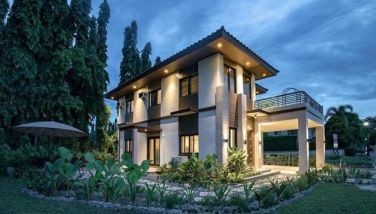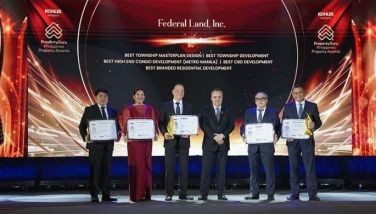Global system for grading structural lumber developed
December 13, 2003 | 12:00am
LOS BAÑOS, Laguna – A unified system for grading structural lumber among the world’s tropical timber-producing areas has been developed.
The establishment of the system was initiated by a research project undertaken by the Los Baños-based Department of Science and Technology-Forest Products Research and Development Institute (DOST-FPRDI).
Titled "Development and Implementation of Lumber Stress Grading Rules for Tropical Timber in the Philippines," the R&D project is said to be the first of its kind in the world. It was funded by the International Tropical Timber Organization (ITTO), a trade association composed of countries producing and consuming tropical timber.
The lumber stress grading (LSG) framework developed by FPRDI headed by director Florence Soriano was evaluated at the "International Workshop on the Development and Implementation of Stress Grading Rules: Philippine Experience" held recently at the Astoria Hotel in Pasig City.
The ITTO-sponsored workshop was attended by participants from Brazil, Cambodia, Indonesia, Japan, Korea, Malaysia, Myanmar, Papua New Guinea, the Philippines, Thailand, Vanuatu, Australia, and the United States.
The participants also presented the status and prospects of LSG in their respective countries.
"We applaud this development as we realize how critical to national and international trade, forestry, and construction is a harmonized lumber rating method among countries of Southeast Asia, Africa, and South America," stated DOST Undersecretary Florentino O. Tesoro, workshop keynote speaker.
In the Philippines, said Dr. Tesoro, a former FPRDI director, adoption of such standardized procedures is certainly good news. For one, lumber maching grading (LMG) will relieve pressure on overexploited traditional species as stress grading rules increase the use of substitute lesser-known species. (LMG is a technology that classifies lumber into strength groups.)
The system would also enable timber producers to improve their profits as they price their products according to strength and not to some unreliable criteria such as color.
Moreover, LSG reduces material waste and boosts builders" confidence by allowing engineers to design structural components with just the right amount of material required for strength and stiffness.
"In other words," Dr. Tesoro averred, "machine generates more economic opportunities for tropical timber while reducing the amount of forest resource necessary to produce the end-product. Locally, this means that more materials will be available for producing prefabricated structural components to help address the country’s huge housing problem, and that additional jobs will be generated as the housing sector grows."
He reported that the procedures have been field-tested in Ozigo Lumber, one of Metro Manila’s biggest lumber dealers, and at Green Circle Tree Farms, one of the largest sawmills in the country. – Rudy A. Fernandez
The establishment of the system was initiated by a research project undertaken by the Los Baños-based Department of Science and Technology-Forest Products Research and Development Institute (DOST-FPRDI).
Titled "Development and Implementation of Lumber Stress Grading Rules for Tropical Timber in the Philippines," the R&D project is said to be the first of its kind in the world. It was funded by the International Tropical Timber Organization (ITTO), a trade association composed of countries producing and consuming tropical timber.
The lumber stress grading (LSG) framework developed by FPRDI headed by director Florence Soriano was evaluated at the "International Workshop on the Development and Implementation of Stress Grading Rules: Philippine Experience" held recently at the Astoria Hotel in Pasig City.
The ITTO-sponsored workshop was attended by participants from Brazil, Cambodia, Indonesia, Japan, Korea, Malaysia, Myanmar, Papua New Guinea, the Philippines, Thailand, Vanuatu, Australia, and the United States.
The participants also presented the status and prospects of LSG in their respective countries.
"We applaud this development as we realize how critical to national and international trade, forestry, and construction is a harmonized lumber rating method among countries of Southeast Asia, Africa, and South America," stated DOST Undersecretary Florentino O. Tesoro, workshop keynote speaker.
In the Philippines, said Dr. Tesoro, a former FPRDI director, adoption of such standardized procedures is certainly good news. For one, lumber maching grading (LMG) will relieve pressure on overexploited traditional species as stress grading rules increase the use of substitute lesser-known species. (LMG is a technology that classifies lumber into strength groups.)
The system would also enable timber producers to improve their profits as they price their products according to strength and not to some unreliable criteria such as color.
Moreover, LSG reduces material waste and boosts builders" confidence by allowing engineers to design structural components with just the right amount of material required for strength and stiffness.
"In other words," Dr. Tesoro averred, "machine generates more economic opportunities for tropical timber while reducing the amount of forest resource necessary to produce the end-product. Locally, this means that more materials will be available for producing prefabricated structural components to help address the country’s huge housing problem, and that additional jobs will be generated as the housing sector grows."
He reported that the procedures have been field-tested in Ozigo Lumber, one of Metro Manila’s biggest lumber dealers, and at Green Circle Tree Farms, one of the largest sawmills in the country. – Rudy A. Fernandez
BrandSpace Articles
<
>
- Latest
Latest
Latest
October 11, 2024 - 3:45pm
October 11, 2024 - 3:45pm
October 10, 2024 - 11:30am
October 10, 2024 - 11:30am
October 5, 2024 - 12:08pm
October 5, 2024 - 12:08pm
September 24, 2024 - 1:00pm
September 24, 2024 - 1:00pm
September 13, 2024 - 4:00pm
September 13, 2024 - 4:00pm
September 9, 2024 - 9:45am
September 9, 2024 - 9:45am
Recommended




























